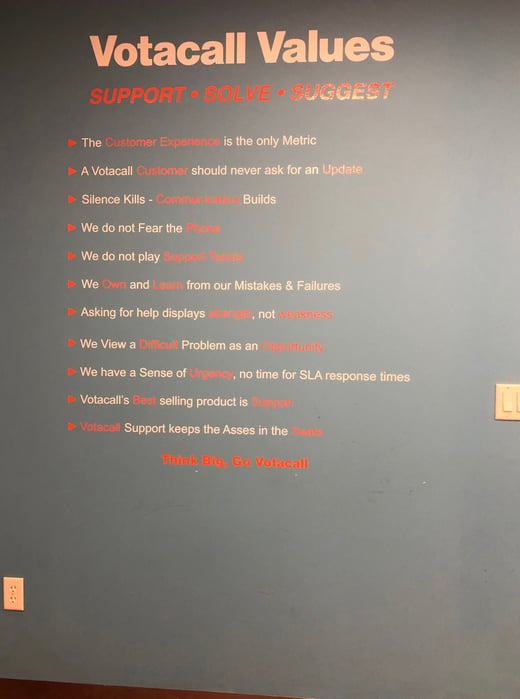Platform
Call Center
Get Started
Wanna subscribe to our blog?
Get updates once a month.
Platform
Call Center
Solutions
Get Started
Wanna subscribe to our blog?
We'll send you updates once a month.
Wanna subscribe to our blog?
Get updates once a month.
Wanna subscribe to our blog?
We'll send you updates once a month.
.png)
So you want to become a customer experience-led organization - great choice.
In a world filled with more product offerings, value props, and frankly BS than ever, there's one thing companies cannot fake...
That's real CX.
It's one thing to make customer experience a priority, and completely another to make it a true differentiator for your company. When done right, it can set you apart in the eyes of your employees, customers, and even competitors.
As a company that operates in an extremely crowded space, we made the decision years ago to lead with our greatest value, which is our ability to deliver a better experience than the one customers in our industry have typically settled for.
I want to share some insights on how we laid the groundwork to position ourselves as a CX leader, and how you can do the same.
"Customer Experience" is a vague term. By definition, it's the perception that customers have each time they interact with your business, from sales all the way to support.
But delivering an elevated experience doesn't mean the same thing in every industry, which is why you need to identify areas where you can separate yourself and win. For example, we knew that in our space, customers are routinely frustrated by the lack of accountability that vendors display, even on the most basic (but disruptive) issues.
So we made a commitment. Votacall customers would never have to hear that an issue "wasn't our problem," even if the issue isn't our platform. At the very least, we would provide suggestions on where the problem might be, and in many cases, we'll reach out to vendors that complement our services (i.e. internet service providers) to troubleshoot on our customers' behalf.
Find areas where your competitors are falling short, and own them. Then, do this 👇
A value system that isn't written down isn't a value system at all.
Once you've established your guardrails, put them somewhere they will be seen. Doing so will help them serve as a constant reminder that we're not conducting business as usual, and that we'll quickly lose our edge if we do.

Our values are our guardrails.
Those are our values. They keep us on track, motivate us, and dictate every interaction that we have with our customers.
To reinforce them, we also like to share real examples when they're applied. At our company, it's common for a support team member to send a company-wide email or post to our message board when someone on the team goes above and beyond for a customer. We all believe that deserves recognition.
Look beyond the skills that are listed on someone's resume. Aptitude is a must, but it shouldn't be the factor that makes you decide on one candidate over another. What you're really looking for is someone who can truly buy in to your system and the principles that you've laid out - skills can be taught, personality cannot.
When we hire a support rep, the first thing we're looking for is a good communicator, which starts with real listening. Repeatedly apologizing or reading from a script doesn't do anything but frustrate customers further - we're looking for people who understand that each customer's challenges are unique and need to be treated that way.
We've also realized how important it is to consistently provide customers with updates as you're solving their issues. You may be working hard to get something done for a customer, but if you don't give them status updates, they may well believe that they're being put on the back-burner. Hiring people who understand the importance of consistent communication is a must for us.
To truly make customer experience a priority at your organization, you need to lay a strong foundation that dictates how situations are handled and keeps everyone on track.
If everyone has a different idea of what constitutes a great experience, you'll have a tough time finding direction.
On the flip side, if you are able to establish guiding principles that employees can use to make decisions, you're giving them a framework that can help them solve problems more quickly and autonomously.
These Stories on Customer Experience
No Comments Yet
Let us know what you think